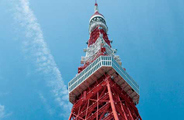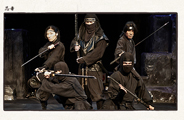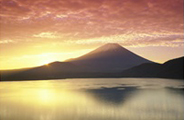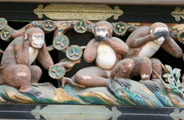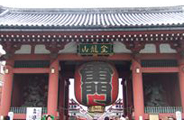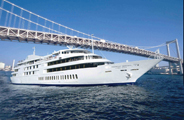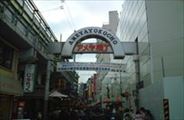Asakusa souvenirs of "Japanese Art"
receiving attention from Japanese people

Asakusa is the leading sightseeing destination in Tokyo. Its popularity in Japan has recently been boosted further still as an area where people can see the Tokyo Sky Tree*, the world’s tallest building. Here, we list some of Asakusa’s beautiful crafts that are “actually useable” and have many fans among Japanese people! (Top photo: Inujirushi Corporation) *To be opened on May 22, 2012. As of December 2011, the building has already reached its ultimate height of 634m, making it the world’s tallest self-supporting radio tower.
What are the fresh sightseeing spots and hot shops in Asakusa? “Canvas bag shops” have many adult fans

The Asakusa 1-chome branch of Inujirushi introduced here is a six-minute walk away from Sensouji Kaminarimon (pictured above), the symbol of Asakusa. “Asakusa Ojima” is a 1-2 minute walk, and “Some no Anbo” is a 2-minute walk.
Asakusa prospers as a sightseeing area centered around Sensouji Temple, which has a history spanning more than 1,300 years. The town has rickshaws for sightseeing and is crowded with shops selling kimono, ornate hairpins, Japanese paper and sundries, and so on. There are infinite ways to enjoy the area, including eating Japanese meals such as shabu-shabu and sukiyaki and gazing at the new Tokyo Sky Tree landmark.
The three Asakusa stores we will introduce here are recommended to people who want to buy souvenirs that show refined taste. Many guidebooks currently being released in Japan feature Asakusa as a town close to the Tokyo Sky Tree building, but such guides tend to focus only on well-known stores.
What each of the stores we introduce here have in common is a modern twist on traditional design together with products that are highly practical. We hope this feature will be of particular interest to people who want to become more familiar with Japanese art!
Ultra-waterproof treatment is applied to the canvas, so the bags can be used without any worries even on rainy days.
First, we will look at Inujirushi, which has countless times been featured in Japanese fashion magazines, etc. and is renowned for the canvas bags that it has produced in the same fashion since its establishment in 1953. At the Asakusa workshop, bags individually manufactured by artisans are displayed with their familiar canvas style and excellent practicality. According to this shop, “These bags can be used for more than 10 years if you repair any damaged parts. Our bags are not flashy, but they are strong and easy to use. We make products that are ageless.”
Customers tend to be people in their 30s or 40s who appreciate “good quality” - many of these are repeat customers. Recently, the store has become so popular that even people from other countries come to buy products here!
The popular tote bags are available in five different sizes and 11 colors, with prices starting from 4,725 yen. Such variety means you should be able to find a bag that you like!
Name embroidery and wooden tag name carving are available at a price of 630 yen, and will be ready 10-15 minutes after you place an order at the shop counter!
You can even have your name embroidered or carved onto the reverse of a wooden tag on the bag you have bought, making a bag that you will want to cherish! This is also a good idea for a thoughtful gift. The subtle Japanese sensibility of the logo and wooden tag further enhance the appeal of this souvenir.
The Harris Tweed bag is both easy to use and outstandingly fashionable!
Aside from canvas bags, the store also stocks new items such as Harris Tweed bags (available at 9,975 yen and other prices) and HELLO KITTY bags (6,300 yen and other prices).
No doubt you will want to use both the reliable standard design products and fashionable original items on a daily basis! These items will forever keep your memories of sightseeing in Asakusa close to you.
“Edo faceted glass” popular with people of all ages!
Edo faceted glass produces designs by carving colored glass. These traditional crafts were born in Edo (the old name for Tokyo) during the final stage of the Edo period, and they continue to be loved even now. Ojima is the name of the famous shop run by Eiji Ojima, an Edo faceted glass artisan.
Ojima-san says that his store is visited by people of all ages even from distant parts of Japan such as the Tohoku region. Edo faceted glass is generally classified as a high-class item, but this store has sake cups and glasses in a wide price range spanning from 2,000 yen up to 80,000 yen. Ojima’s popularity can be attributed to its fine design and broad price range. These beautiful articles are ideal for personal use, for visitors, or as gifts...
Many traditional designs are based on themes that were seen in Edo life, such as hemp leaves, chrysanthemum, and “gyoshi” (a fish egg design). Pictured is a traditional combination of a lattice and bamboo grass. This pair of sake cups for Japanese rice wi
“We have traditional and original designs,” says Ojima-san. Fireworks motifs are the best-selling items. The green version sells for 5,000 yen, and the blue version for 7,000 yen. The pattern shines and glitters to an even great degree when filled with a
Modern hand towels as preferred by women
Asakusa has countless stores dealing in hand towels and cloth wrappers, and one of the most popular stores is called “Some no Anbo”. The parent company of this specialist shop also has its own dyeing factory, resulting in modern and original designs with vivid colors.
Some no Anbo says that its popularity with women is not only down to its design sense, but is also thanks to the excellent user-friendliness of its 100% cotton products... “Our material is absorbent and quick-drying and does not fluff up. That’s why it’s perfect for wiping and polishing tableware. It can be used in various ways - folded up as a pot stand, as a place mat, and so on.” By all means try adopting these handy and artistic hand towels in your daily living!
Many women choose these lovely flower patterns. Clockwise from top: Japanese apricot (1,680 yen), rose (1,470 yen), camellia (1,470 yen). Stock changes frequently, and there is a wealth of designs to evoke the four seasons. These are recommended for use a
The stylish design on the left shows a Japanese musical instrument called a “shamisen” (1,260 yen). On the right is a spider design that has for ages been used as a lucky charm (1,050 yen) to protect one’s household and realize one’s dreams, etc. There ar
SHOP DATA
*Products, prices and services, etc. provided by these shops are subject to change.

●Inujirushi Asakusa 1-chome Store 1-11-1 Asakusa, Taito-ku, Tokyo Tel.: 03-3844-5377 Open 09:30-19:00
>>Inujirushikaban
●Ojima 2-3-2 Asakusa, Taito-ku, Tokyo Tel.: 03-5828-3996 Open 10:00-17:00
>>Ojima
●Some no Anbo Main Asakusa Store 1-12-12 Asakusa, Taito-ku, Tokyo Tel.: 03-5806-4446 Open 10:30-19:00
>>Some no Anbo




























